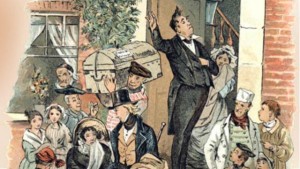Home » Commentary » Opinion » Humbugging our way to damnation
· Ideas@TheCentre
 Prominent billboard advertisements for a large and important Australasian bank perfectly illustrate and exemplify the besetting sin of contemporary intellectual and political life: humbug. The advertisements suggest that the bank is working for the creation of a more equal world, which cannot possibly be the case and is, in effect, a lie. At least, one hopes it is a lie, for that is the most charitable interpretation of the slogan.
Prominent billboard advertisements for a large and important Australasian bank perfectly illustrate and exemplify the besetting sin of contemporary intellectual and political life: humbug. The advertisements suggest that the bank is working for the creation of a more equal world, which cannot possibly be the case and is, in effect, a lie. At least, one hopes it is a lie, for that is the most charitable interpretation of the slogan.
It is obvious that the aim of a commercial bank cannot be a more equal world, if only because it has financial obligations to its shareholders that it does not have to the rest of humanity. The former have not invested to provide everyone in the world with paid dividends; and while they might hope that the bank’s activities are honest and contribute to the growth of the economy, this is not at all the same thing as equalising the world.
A world in which everyone were starving might be a more equal world, indeed a perfectly equal one. Equality of misery is equality all right, but is not therefore either a just or desirable goal that the bank might pride itself on having brought about. What the bank really meant — if it meant anything at all — was that it was working towards a richer, more prosperous world. But working for wealth does not have the same moral cachet as working for equality.
In short, the bank was indulging in humbug; unctuously proclaiming ideals that it cannot, will never and ought not to have.
But does such humbug matter? After all, no one really expects to derive either truth or information from advertisements. I think it does matter, however: for humbug is an insidious pollutant of the mind, which not only distorts but perverts. It clears the primrose path to earthly damnation.
Theodore Dalrymple is the Centre for Independent Studies 2016 Max Hartwell Scholar-in-Residence.
Humbugging our way to damnation